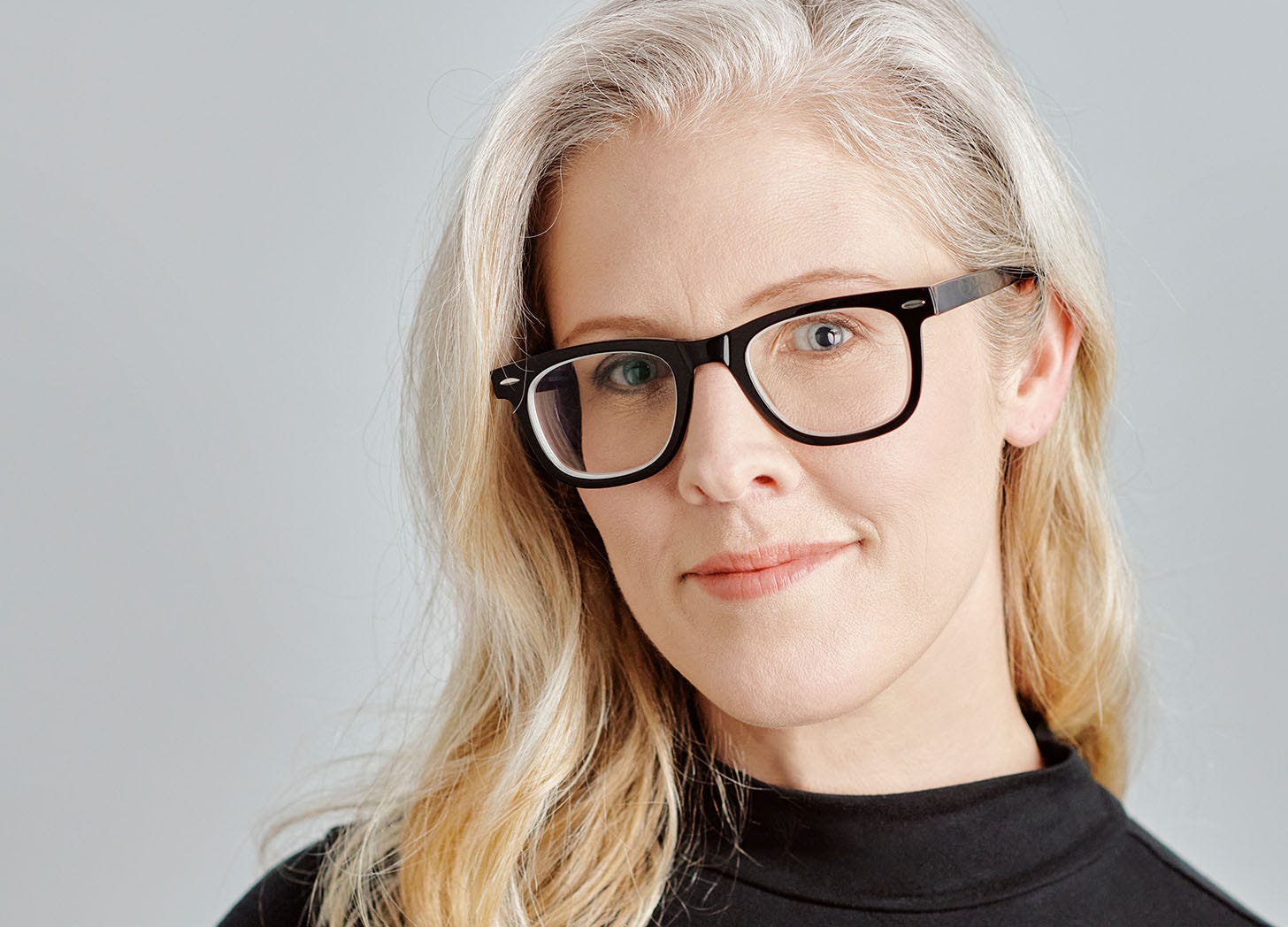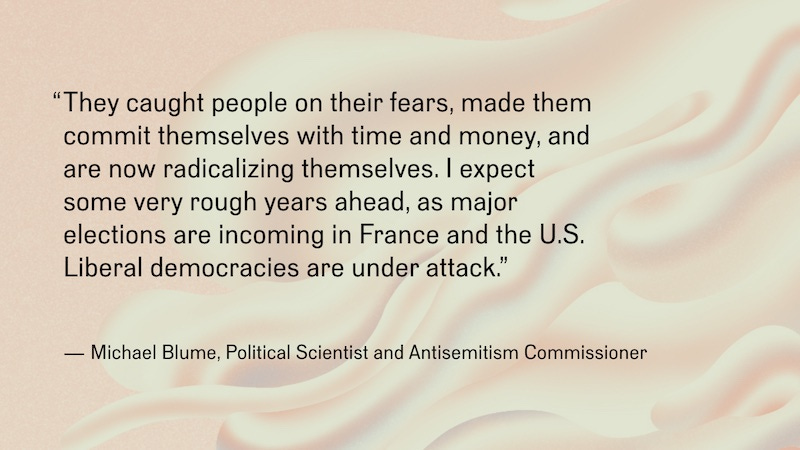"Everybody stinks. Don't stink, and you'll be fine."
NBC News' Brandy Zadrozny on tackling imposter syndrome, Tucker Carlson, and why "SCOOP:" won't appear in her social feeds.
In today’s polarized media landscape, navigating the overwhelming tide of headlines — particularly those that drift into political radicalization, extremism, and the murky depths of disinformation — can be daunting. Thankfully, this is precisely the environment in which Brandy Zadrozny, a librarian turned journalist, excels. Carving out a unique niche for herself, the NBC News senior reporter leverages her varied background, which includes stints at ABC News, Fox News, and the Daily Beast, to deliver news with investigative rigor, focusing on the internet-born movements that have the potential to reshape our world.
Zadrozny’s work about online extremism couldn’t be timelier. It demonstrates how fringe theories like QAnon and the Stop the Steal movement have infiltrated mainstream conversations and challenged our understanding of what's merely online chatter and what impacts reality. Her commitment to unearthing the roots of online radicalization and disinformation has made a few powerful enemies, notably in 2020, when she became a target on Tucker Carlson's popular Fox News show, which she describes further in our conversation.
Despite these challenges, Zadrozny’s dedication to uncovering the truth has never wavered. Armed with relentless research skills and a nuanced understanding of the digital labyrinth, her work stands out as not only a testament to journalistic excellence but also as a beacon of integrity in an era where truth is all too often a casualty.
It’s with this in mind that I’m happy to introduce Zadrozny as the subject of the latest installment of Depth Perception’s Leading Questions feature. —Parker Molloy
Why did you become a journalist?
My first journalism gig was an internship in ABC News’ research department while I was in library school. I was planning to go into school or public librarianship, but my project at ABC News — watching and writing descriptions for thousands of clips in the network’s historical collection — kind of hooked me on journalism.
From there, I worked in research departments and eventually took the leap to reporting and writing at the Daily Beast in 2013. Why I stay a journalist, even as this industry falls apart, is because I often find real joy in it: calling up anyone and asking any question I want, writing something that sets the record straight, etc. I think a lot about what David Carr said, “It beats working.”
What story of yours are you proudest of?
I’m proud of the kinds of stories that effectively say, “Hey, that thing that everyone is freaking out about? Slow down, it’s not what you think, and here are the people who are profiting politically or financially from you being afraid or mad.”
One example is this story from Klamath Falls, Oregon. In 2020, in small towns all over the country, these Facebook rumors were flying that antifa was coming to town in George Soros-funded buses to destroy white neighborhoods. It was a laughable premise, but people were getting really up in arms about it — literally. A few dozen people in Klamath Falls (mostly people of color and allies in this very white town) were getting together on Main Street and holding Black Lives Matter protests.
The Facebook rumors coupled with the small protests erupted in a panic and hundreds of their white neighbors came armed to “protect their businesses” from antifa. The thing I love about this story was that someone — if only briefly — seemed to learn a lesson. One of the counterprotest organizers told me that yeah, he had been wrong. Some kids came out to peacefully protest and they were greeted with guns. He felt bad. I find hope in moments like that.
What story of yours do you most regret?
I don’t know that I regret it, but there are times when I think maybe I shouldn’t have focused my beat on the far-right internet influencers who hijack so much of the national conversation. I wonder if it's changed anything and bristle at the costs.
I wrote a story that detailed shenanigans around the Hunter Biden laptop and focused on a far-right blogger which got me a one-way ticket to Tucker Carlson’s enemies list. [Ed. note: see “Further reading” section below.] And that’s not a nice place for a regular person to be. I wrote about how the brains behind the whole half-baked “Censorship Industrial Complex” conspiracy theory was actually an alt-right blogger, a racist conspiracy theorist who courted white nationalists. And I don’t regret it, but I do wonder, “Is there a point to this? Because yesterday the guy was fawned over by Tucker and Elon and tomorrow he’ll probably be cited in another congressional hearing.”
What’s the best journalistic career advice you ever received?
Pamela Colloff, the brilliant magazine writer and all-around good human, gave a talk in the city years ago. I attended with my third child, a newborn, strapped to my chest. I was feeling very “in it,” wondering if I could pull off momming and work, and she said something along the lines of “I had a child and immediately felt like, ‘Well, that’s it! Journalism is done with me! I’ll never write again!” But she came to view being a mother as a secret kind of power – it made her more empathetic, and better at her job in myriad ways. I try and see my identity as a mother as a plus.
Also, I don’t know if it’s the best, but I think about it a lot, one of my former bosses, as I was leaving for another gig, left me with the sage advice, “Everybody stinks. Don’t stink and you’ll be fine.” It helps with the anxiety this profession can spark.
Similar to QAnon, Querdenken has become a successful conspiratorial ideology, one that led to thousands of Germans protesting public health measures as well as rejecting proven science, disputing settled history, and shattering societal norms.
Go down the rabbit hole with Long Lead’s production “Querdenken Everything,” and learn about a Capitol storming that happened overseas mere months before January 6, 2021.
What is the worst journalistic career advice you’ve ever received?
“Stay in your lane.”
What is a widely accepted journalistic rule or norm that you hate?
That scoops matter. I couldn’t care less about being five minutes early to a story. What matters to me are exclusives and distinctive reporting. I’ve seen reporters willing to sell their souls so they could tweet “SCOOP:” about a totally inconsequential story. At best, it’s thirsty, and at worst, it incentivizes sloppiness. I do understand the way independent reporters might need the frame to sell themselves but still, I just don’t like it.
What was the most indulgent media event you've ever attended?
Ha, well I don’t get invited to many, but I do love to dress up and eat free food so I don’t know that I’d badmouth any. But… I did attend a very fancy event a couple of years ago put on by a well-meaning billionaire and it was billed as, “The Conference to Save the Internet.” (I’m paraphrasing.)
It was very very flashy. Everyone important from the tech / politics / media world seemed to be there, many paid for their time, and people said “Web3” and “blockchain” a lot. The event was dizzying — an art exhibit sat at the center: this massive two-story sphere made up of millions of single images undulating in neon colors and backed by an unnerving soundtrack of ambient organ music. Lunch was delicious, though.
“I’ve seen reporters willing to sell their souls so they could tweet ‘SCOOP:’ about a totally inconsequential story. At best, it’s thirsty, and at worst, it incentivizes sloppiness.”
What’s one app, tool, or service that you can’t do your work without?
The Internet Archive. I use it every day. Multiple times a day. The forethought and commitment to preservation of Brewster Kahle and the crew there blows my mind every time I think about it. What a service they’ve done for the world.
What makes you think journalism is doomed?
The nationalization of news and politics really bums me out, and I say this obviously as a national reporter. Local news is dying, has been dying, and will continue to die, unless something seismic changes. And I just don’t know what that change might be.
What makes you feel hopeful for the future of journalism?
My colleagues, good newsletters and podcasts, local news initiatives, worker-owned news startups that do journalism and make money. Things aren’t great at the moment, but I think journalism will find a way.
Further reading by Brandy Zadrozny
“Utah advances bill to criminalize ‘ritual abuse of a child,’ in echo of 1980s satanic panic” (NBC News, Feb. 23, 2024)
“Disinformation poses an unprecedented threat in 2024 — and the U.S. is less ready than ever” (NBC News, Jan. 18, 2024)
“How the conspiracy-fueled Epoch Times went mainstream and made millions” (NBC News, Oct. 13, 2023)
“The ‘Flu Shot Cheerleader’ is back — with a warning about the anti-vaccine movement” (NBC News, Aug. 4, 2023)
“Inside the campaign to ‘pizzagate’ Hunter Biden” (NBC News, Oct. 22, 2020)








Excellent questions and answers - and who doesn't love a free lunch, hey?